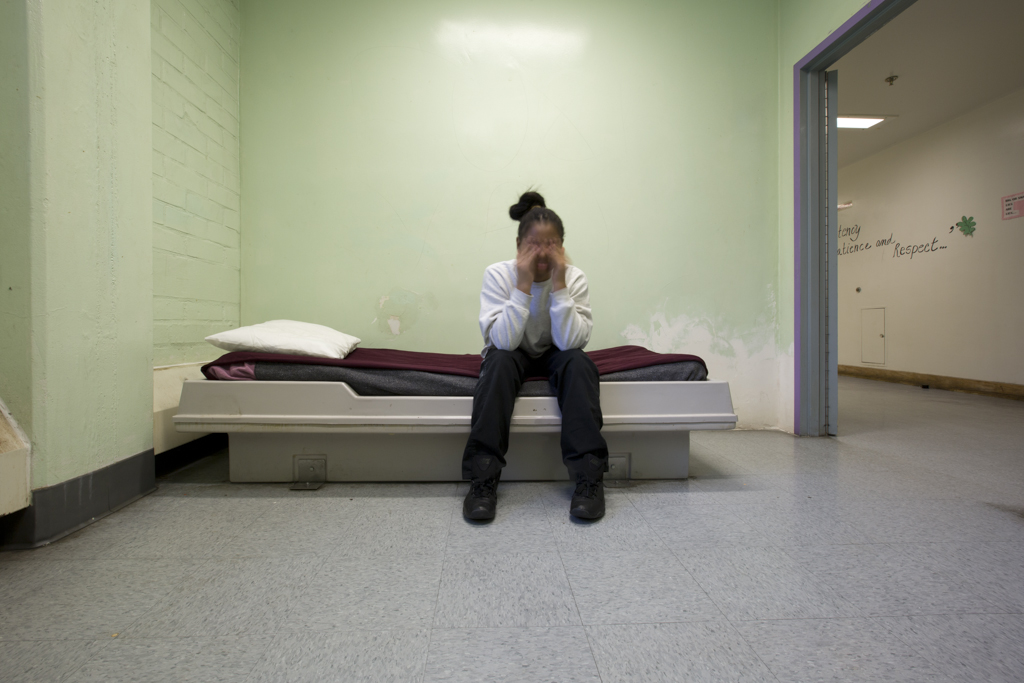By Richard Ross “I miss you like a prison mom.”
Mary Graham has missed her son for the past thirteen years. Since he was sixteen, Terrence has been incarcerated. He was sentenced to die in prison. Terrence grew up with two crack-addicted parents. School was a series of sixteen different institutions as evictions created dislocation and disruption. Classes were special ed for Terrence and his three brothers. School represented food and nutrition. Without the breakfasts and lunches, one brother, Tavaris would get a bag of Doritos and parse it out as a meal to the four boys.
Mary remembers the fridge being adequate. “We grew up country. My Mama used to say if you had bread and potatoes in the house you could always make a meal. It was hard. My kids might have some bread and jelly, but they never went to bed hungry.” Terrence remembers other parts of that narrative. “There would be spoiled milk or government cheese in the refrigerator.”
“We were poor. I would cook one plate of food and put it in front of Diante. He would eat his fill and move the plate to Terrence. Terrence would eat and then move it to Michael, and then to Tavaris. After all the boys ate from the same plate…if there was anything left over I would eat. It was hard. We weren’t the Brady Bunch.”
[aesop_parallax img="https://www.juvenile-in-justice.com/wp-content/uploads/2016/08/AO9A0362.jpg" parallaxbg="off" captionposition="bottom-left" lightbox="on" floater="on" floaterposition="left" floaterdirection="up"]
Mary has met God.
AO9A0385
It happened on day on December 14th. She had smoked crack incessantly in the six years prior. On the 14th, she prayed and stopped completely.
The six years of parties and a house full of addicts stopped. Prayer had replaced the emptiness and silence of the apartment. Mary apologized to her four boys, the youngest of which still kicked in her womb at the time, and she began her life again. “Mom has been sick for a long time,” she would tell them. But the lives of her boys were already in tatters. All had been incarcerated. Sixteen schools, sometimes no food, crack cocaine parties with an endless parade of strangers for more than six years.
This narrative is an American story. Not the Norman Rockwell, but the alternative, yet no less true. Mary grew up with her grandmother in rural Jacksonville. There were sixteen children served by pigs, chickens and goats. The family went well beyond the sixteen children and two adults—there were cousins and aunts—and the house kept on being built out to shelter them all. Mary and her sister slept in the bed with her grandmother. “Lots of people. Lots of kids. It was hard but we made it. Drugs were not in fashion back then.”
“Then we moved into central Jacksonville and my parents separated. My mother got a job at Milligan’s and tried to take care of the four of us. She was making $2.35/hour. It was hard. It got too hard for my mom so she let my dad take us. When I was 15 I started to party. I was new to the game but I enjoyed the life of the city. I met Harry when I was 20. He was a Vietnam vet 11 years older than me.”
Three children later, they were in a whirlwind of crack and abuse—“we were kicked out of the house and we weren’t let in. We stayed in the street while the party went on.”
Section 8 evictions, drugs, violence—where was Family Services? Mary explains, “there are two kinds of addicts…I was an ‘in-control’ addict. When they would come because of complaints, I would be able to put on a controlled face. They would come, because Michael was out of control a lot. He was what you call ADD. He would do things like try to set an apartment building on fire. They came to look at my apartment and I would always have it neat. I kept a neat house.”
_____
Bryan Gowdy doesn’t like the reference to Atticus Finch, although he is tall, lanky, soft-spoken, and works out of a modest two story building in Jacksonville. “I was working a lot of appellate corporate law and I thought this would be an interesting, individual case. I certainly didn’t expect to be arguing in front of the Supreme Court.”
"There was a surprise ruling by the Florida Supreme Court last week. They overturned sentences of life with the possibility of parole that had been doled out, citing that they were counter to the U.S. Supreme Court ruling Graham v. Florida. The majority argument was that because a defunct Florida parole system had not granted parole to a single person sentenced to life in prison, the state could not continue to sentence juveniles to life with the possibility of parole. In fact, as the state evaluates parole, the fact that the inmate was a juvenile at the time of a crime counts against them.
This is counter to Supreme Court decisions that have determined the adolescent brain to be still developing, giving children the unique possibility of reform and rehabilitation. The practice of the parole system in Florida is so counter to this information, that the Supreme Court here has ruled life with parole effectively is still a death sentence for a child in Florida.”
“Effectively I am a small business with my partner. I have a family to support so I can’t take all the cases I would like to take. But I am going to take a new case that relates to this. Too much is a stake for these kids.”
“When Terrence was first sentenced, the authorities had somehow painted the family as being nuclear, well cared for with nurtured, loved children. The judge was influenced by the discordant actions of a teen who would turn his back on this perfect home. When the case was returned from the Supreme Court for resentencing, the judge looked at a more detailed, revealing and demining picture of Terrence’s environment and the mitigating factors contributing to his delinquency. It was the polar opposite of what was presented in the original sentencing. Realistically when you argue for them you have to prepare as if each case is a death penalty case…effectively they are. When there are determinate sentences that are 50, 60, 70 years and the parole system is so hostile, they are death sentences.”
Meanwhile in Starke, Florida, Terrence is in the Main Unit West. He helps clean and cook for the Close Managed section that houses the behavioral problems and the sixty-six inmates of death row. Soft-spoken, Terrence explains ‘When I came into the system and looked at my EOS (End of Sentence) date it said ’99-99-9999.’ That meant I was never getting out. Now I look at it and I figure I served 13 years now and have a 25 year sentence. I have some time earned for behavior so I have about eight years left. I get out sometime around 2025. It’s a real date.’”
AO9A0173





